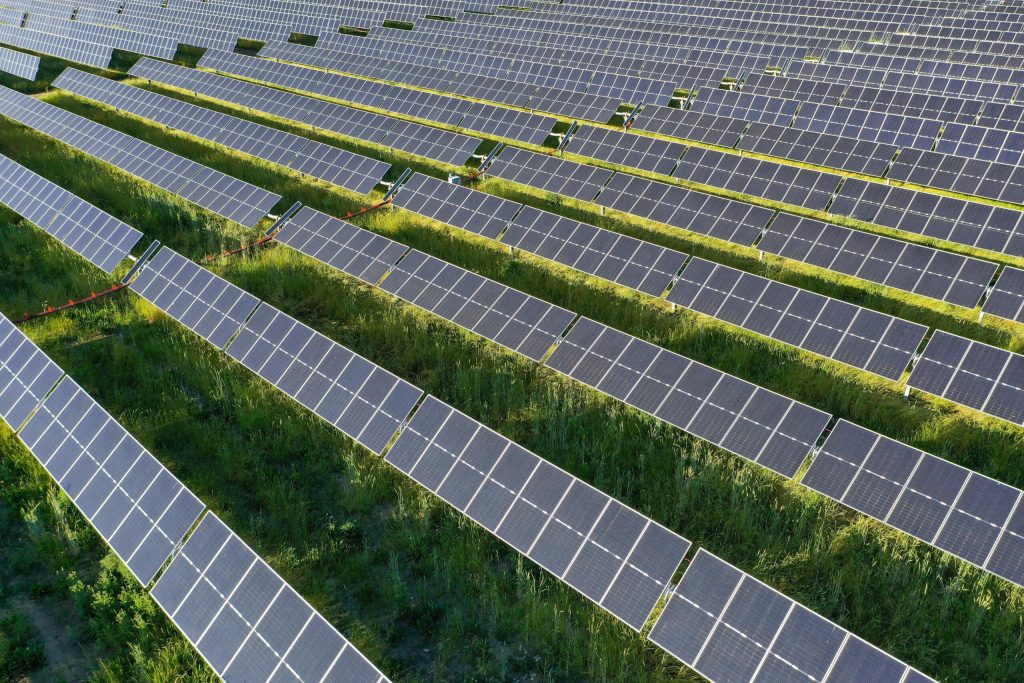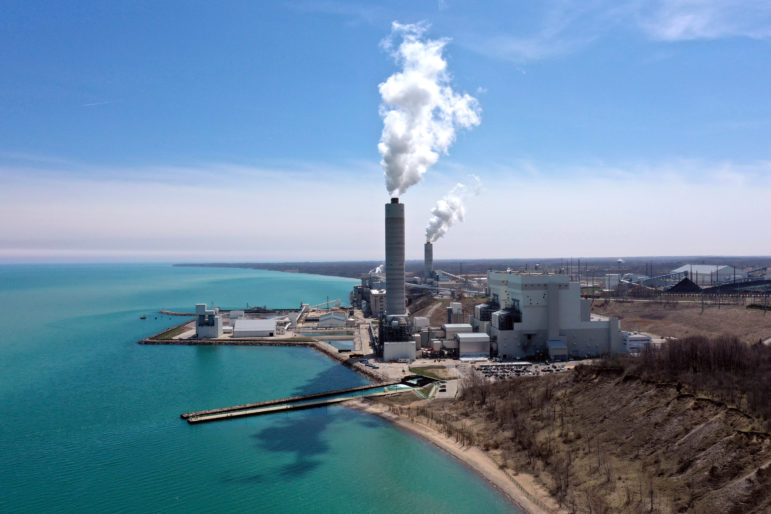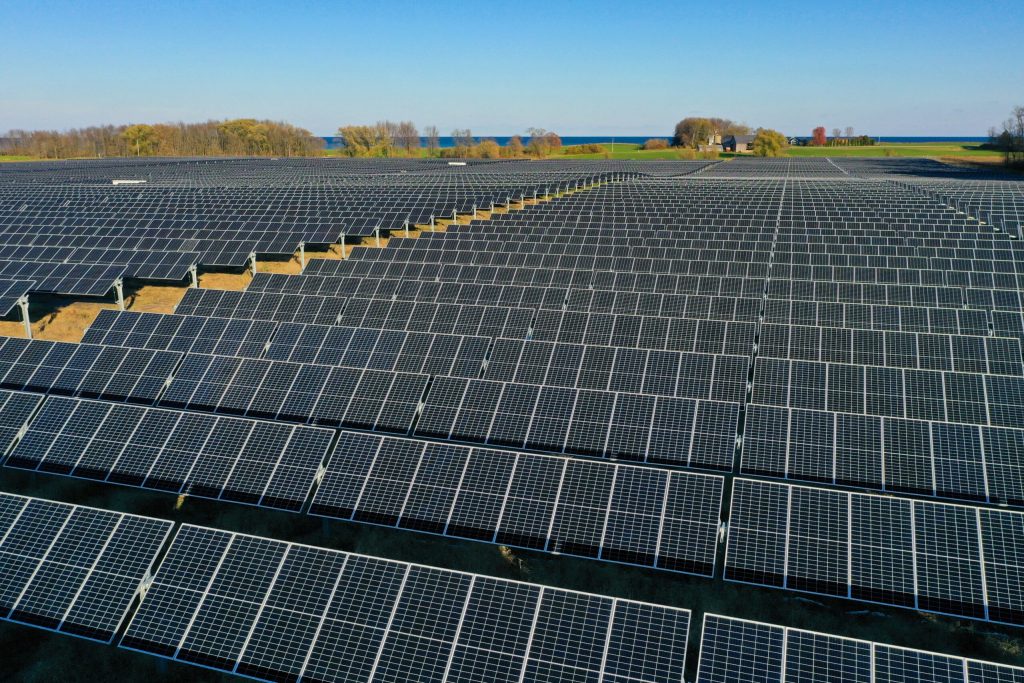Wisconsin Utilities Attempting To Balance Power Demand From New Data Centers With Renewables
Massive new data centers, like Microsoft's Mt. Pleasant project, will change how We Energies, others pursue renewable energy.

The first 150 megawatts of the 300-megawatt Badger Hollow solar farm went online on Dec. 1, 2021. Wisconsin Public Service and Madison Gas and Electric own the project, which was developed by Invenergy. Photo courtesy of Wisconsin Public Service
As big tech companies race to capitalize on artificial intelligence, utilities in Wisconsin are assessing how to balance surges in demand for power amid the clean energy transition.
Executives from some of the largest utility and transmission companies serving Wisconsin took part in a series of panel discussions Wednesday about the state’s energy future. They, along with advocates for local governments and large industrial energy users, talked about managing increased demand for power amid the rapid development of artificial intelligence, or AI, and other technologies. The forums were hosted by Competitive Wisconsin, Inc. and broadcast on Wisconsin Eye.
“This is a major race between highly sophisticated tech companies. They need reliability, and they need speed to market. We’re trying to accommodate both,” said Bert Garvin, an executive vice president with WEC Energy Group.Microsoft runs more than 300 data centers in over 34 countries. That includes an Iowa data center that was the birthplace of GPT-4, the AI large language model system that mimics human speech and writing from Microsoft-backed Open AI.
How could increased demand affect carbon reduction goals?
Wisconsin’s five largest utilities, including We Energies, have pledged to go carbon-neutral by 2050 in line with Gov. Tony Evers’ goal to ensure carbon-free electricity by that year.
However, utility executives say natural gas will be a key part of their power mix for the foreseeable future as they invest in renewable energy projects that are anticipated to save customers billions over the next several decades.
Karl Hoesly, president of Xcel Energy in Wisconsin and Michigan, said natural gas will be an important bridge fuel, especially with more energy demand from data centers coming online.
In a separate discussion, Garvin said it’s a challenge for WEC Energy Group to shift their customers and businesses away from natural gas, arguing it’s not cost-effective in the near term. The company’s utility, We Energies, recently announced a $1.2 billion plan to convert its Oak Creek power plant from coal to natural gas.
Environmental groups like Clean Wisconsin and the Sierra Club have pushed back against utilities’ plans to build more natural gas infrastructure as scientists have urged drastic cuts in carbon emissions. While natural gas produces roughly half the carbon emissions as coal, they note such production releases methane that has more than 80 times the warming power of carbon dioxide over the span of two decades.

The plants, in Oak Creek, Wis., near Milwaukee, are coal-fired electrical power stations. Coburn Dukehart/Wisconsin Watch
Some say utilities should slow coal plant retirements
Todd Stuart with Wisconsin Industrial Energy Group expressed concerns as the Midwest regional grid operator has faced pressure to meet spikes in demand amid extreme weather and coal plant retirements. He fears significant growth from data centers may eat into the regional grid’s reserve power supply. Stuart said utilities may want to slow plans to retire plants
“Once these plants shut down, things could get pretty tight, given the load growth that might be happening,” said Stuart, the group’s executive director.
Consumer advocates say the state should maximize energy efficiency as customers have seen their utility bills climb in recent years during the transition and plant retirements.
Tom Content, executive director of Wisconsin’s Citizens Utility Board, noted Focus on Energy — the state’s energy efficiency program — has helped cut power demand by an amount equal to the output of two natural gas plants.
“We know that data centers consume a lot of energy. We’re hopeful that the new chips are going to make those more energy-efficient, but the tech companies have to be ready to pay their fair share,” Content said. “And asking homeowners and small businesses to pay for a lot of this expansion is a lot to ask.”

The Two Creeks solar plant in Manitowoc County went online in November of 2020. With half a million solar panels, the solar farm can provide enough power for 33,000 homes. Photo courtesy of Wisconsin Public Service
As some seek energy savings, others want the state to build more capacity
At the same time, Mark O’Connell, president and CEO of the Wisconsin Counties Association, said he’d like the Legislature to take a proactive approach by supporting more power generation amid growing demand from AI and electrification of the state’s transportation system. “We anticipate we’re going to need this kind of capacity in the future. Let’s build it now, so we’re ready for it when it comes,” O’Connell said, citing the economic development opportunities for counties.
“But that’s a one-time deal. That’s not a full-state look at opportunities and infrastructure to support all around the state,” Mogensen said. “But that certainly was a potential key attractant for being able to move faster that may have helped to draw Microsoft in.”
Mogensen and others say the Legislature could also consider “batching” transmission projects together to streamline permitting, invest more resources to add and retain PSC staff, or provide more options to reduce or shift energy use through time-of-use rates.
Utilities weigh power demand from AI amid clean energy transition was originally published by Wisconsin Public Radio.
If you think stories like this are important, become a member of Urban Milwaukee and help support real, independent journalism. Plus you get some cool added benefits.






















Such backwards thinking. Data centers consume large amounts of electricity, are housed in large buildings with flat roofs, benefit from shading/cooling, can be more efficient if run off DC instead of AC power, and usually eperience highest demand during the workday.
All new data centers should be mandated to require photovoltaic installs on their roofs and possibly over their outside parking areas.
Fraction of the overall building cost, redundant power supply, lower operating costs, fewer new power lines to run, all net positives to the owner, municipality,and state.
So technology demands that we use more power and water resources so we can trade crypto and watch AI Homer Simpson videos. The price of Nvidia and other tech stocks certainly bears this out! (As a sidenote, very warm in MKE this winter. No worries).